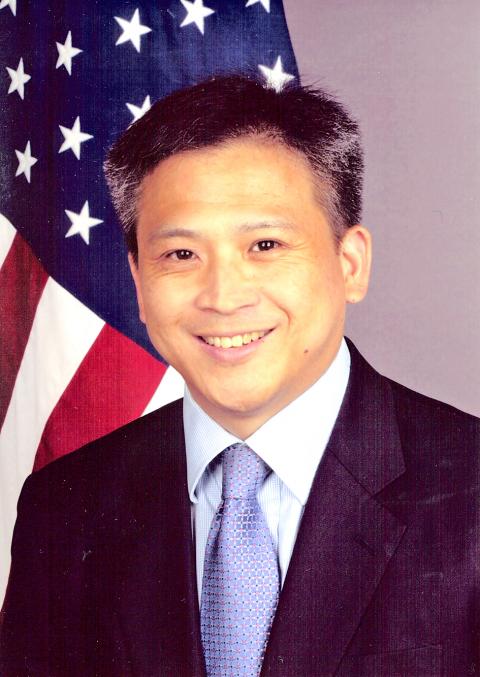A senior US Department of State official with extensive working experience of Taiwan-US affairs is set to become the new director of the Taipei Office of the American Institute in Taiwan (AIT) this summer.
US Deputy Assistant Secretary of State for East Asia Kin Moy is to take over from AIT Director Christopher Marut.
Moy has served in the US Foreign Service for more than 20 years. He most recently had responsibility for Taiwan, China and Mongolia affairs.

Photo courtesy of the American Institute in Taiwan
Prior to that assignment, he served as a senior adviser to former US secretaries of state Hillary Rodham Clinton, Condoleezza Rice and Madeleine Albright.
In addition, he has served in the US embassy in Beijing, the US embassy in Seoul and the US Consulate in Busan, South Korea.
As a career member of the US Senior Foreign Service, he holds the rank of minister counselor.
Moy, married with four children, graduated from Columbia University and the University of Minnesota. He is a Mandarin speaker.
He takes over as director of the AIT at a particularly sensitive time, with the presidential and legislative elections in Taiwan in January next year.
Moy is also expected to be deeply involved in Taiwan’s bid to join the Trans-Pacific Partnership (TPP) trade agreement next year.
“Maintaining and deepening our strong unofficial relations with Taiwan is an important part of US engagement in Asia,” Moy said in his most recent major speech on US-Taiwan affairs at the Carnegie Endowment.
He said that much of the history of the 21st century would be written in Asia and a critical part of the US’ strategy would be “building the comprehensive, durable, mutually beneficial relationship between the US and Taiwan.”
“Our broad ranging, unofficial relationship is deeply in the interests of the US. It is founded on our shared values — a commitment to freedom and democracy — and cultivated through our ongoing spirit of cooperation,” Moy said.
Taiwan is recognized around the world, he said, as a model for both economic development and democratic reform.
Moy said that the US fully supports Taiwan’s membership in international organizations where statehood is not a requirement and encourages Taiwan’s “meaningful participation” in organizations where its membership is not possible.
On cross-strait relations, Moy said in the Carnegie speech that the US commended the progress achieved in recent years and encouraged both sides to continue those efforts.
“The reason is straightforward; maintenance of cross-strait stability is essential to the US goal of promoting peace and prosperity in the Asia-Pacific region,” he said.
In Taipei, Ministry of Foreign Affairs spokesperson Anna Kao (高安) said the government welcomes the appointment of Moy, who has played a part in mapping out US policies on Asia-Pacific affairs and “is familiar with the development of Taipei-Washington ties.”
“We believe that Moy will help expand and advance the Taiwan-US partnership, based on the strong foundations laid by his predecessor, Christopher Marut,” Kao said.
Moy is set to be the first AIT director of Chinese descent since the institution was established in 1979 after the US switched diplomatic recognition from Taipei to Beijing.
Additional reporting by CNA

The CIA has a message for Chinese government officials worried about their place in Chinese President Xi Jinping’s (習近平) government: Come work with us. The agency released two Mandarin-language videos on social media on Thursday inviting disgruntled officials to contact the CIA. The recruitment videos posted on YouTube and X racked up more than 5 million views combined in their first day. The outreach comes as CIA Director John Ratcliffe has vowed to boost the agency’s use of intelligence from human sources and its focus on China, which has recently targeted US officials with its own espionage operations. The videos are “aimed at

STEADFAST FRIEND: The bills encourage increased Taiwan-US engagement and address China’s distortion of UN Resolution 2758 to isolate Taiwan internationally The Presidential Office yesterday thanked the US House of Representatives for unanimously passing two Taiwan-related bills highlighting its solid support for Taiwan’s democracy and global participation, and for deepening bilateral relations. One of the bills, the Taiwan Assurance Implementation Act, requires the US Department of State to periodically review its guidelines for engagement with Taiwan, and report to the US Congress on the guidelines and plans to lift self-imposed limitations on US-Taiwan engagement. The other bill is the Taiwan International Solidarity Act, which clarifies that UN Resolution 2758 does not address the issue of the representation of Taiwan or its people in

US Indo-Pacific Commander Admiral Samuel Paparo on Friday expressed concern over the rate at which China is diversifying its military exercises, the Financial Times (FT) reported on Saturday. “The rates of change on the depth and breadth of their exercises is the one non-linear effect that I’ve seen in the last year that wakes me up at night or keeps me up at night,” Paparo was quoted by FT as saying while attending the annual Sedona Forum at the McCain Institute in Arizona. Paparo also expressed concern over the speed with which China was expanding its military. While the US

SHIFT: Taiwan’s better-than-expected first-quarter GDP and signs of weakness in the US have driven global capital back to emerging markets, the central bank head said The central bank yesterday blamed market speculation for the steep rise in the local currency, and urged exporters and financial institutions to stay calm and stop panic sell-offs to avoid hurting their own profitability. The nation’s top monetary policymaker said that it would step in, if necessary, to maintain order and stability in the foreign exchange market. The remarks came as the NT dollar yesterday closed up NT$0.919 to NT$30.145 against the US dollar in Taipei trading, after rising as high as NT$29.59 in intraday trading. The local currency has surged 5.85 percent against the greenback over the past two sessions, central